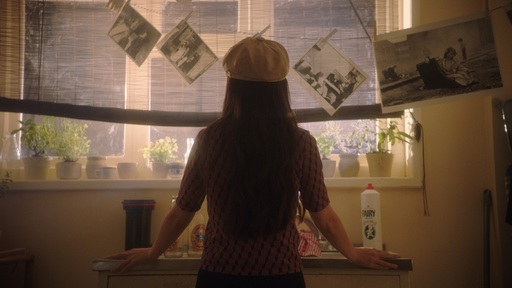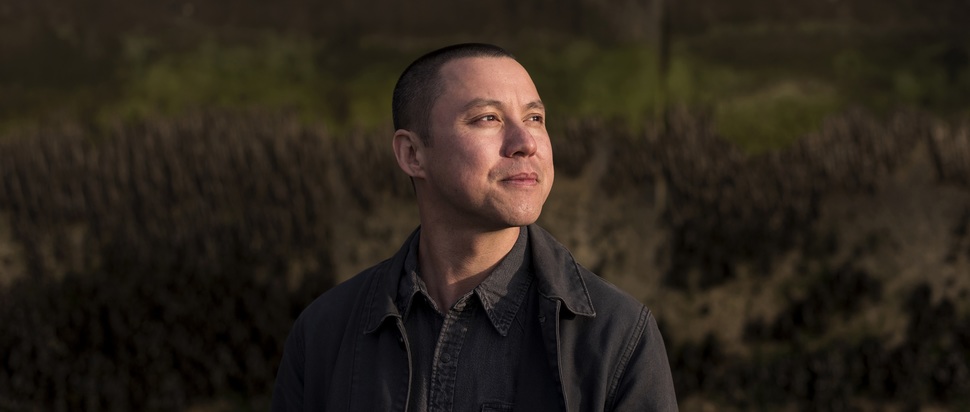Scotland on Screen: Paul Sng
Paul Sng's latest film is a tender portrait of Tish Murtha, a hugely talented photographer who documented working-class lives in 70s and 80s Britain. Sng talks to us about coming to film late, imposter syndrome and Scotland's supportive doc community
Film culture loves to celebrate rookie youngsters fresh from film school. Just consider the number of industry training schemes, competitions or funding opportunities where the cut-off to participate is around the time you disqualify for a young person’s railcard. Plenty of filmmakers weren’t born with a silver camera in their hand, though. That’s certainly Paul Sng’s story. As a working-class kid growing up in southeast London, film school seemed like an impossible dream. “It's very important, I think, when you're looking to do anything in life that you can see yourself in those positions,” Sng tells us over Zoom from his home in Portobello. “For me, how I grew up and where I grew up, film school just didn't seem to be an option.”
Sng was in his late 30s when he picked up a camera in earnest for his debut feature. “My first film happened because I met the Sleaford Mods,” Sng explains. He’d been interviewing the post-punk duo for another project and they mentioned they were planning a tour of unglamorous small towns. Sng realised a documentary of that tour would also double as a potent state of the nation film about places in the UK that have been left behind by deindustrialisation; this idea became Sleaford Mods: Invisible Britain.
“I had a full-time job while I was doing Invisible Britain, and then they didn't renew my contract. So at that point, I sort of thought, well, I’ve made one film, I'll try and make another.” That follow-up was 2017’s Dispossession, a clear-eyed investigation of the UK’s malfunctioning housing system that only feels more pertinent five years on. “It probably wasn’t until I'd made Dispossession, and it had done fairly well, that I felt able to call myself a filmmaker,” says Sng. “I had intense imposter syndrome.”
The last time Sng felt this twinge of imposter syndrome was at this year’s Sheffield Doc/Fest, just before going out to introduce his excellent new documentary Tish, which was opening the festival. “It was a big honour, but I panicked on opening night,” he admits. “I had to introduce the film and it was in Sheffield City Hall, which is a 2000-capacity venue. I don’t usually get nervous at public speaking but I was waiting in the wings to come on, and my knees were knocking. I was like, 'Oh God, what am I gonna do? I can’t walk out there.'” Luckily there was some inspiration on the walls backstage. A plaque was up sharing the names of the luminaries who had appeared on stage there, names like the Beatles, David Bowie and Blondie. “I just looked at this sign and I thought, ‘I'm just a wee guy from southeast London who’s here to introduce a film, and then walk off. I don’t have to sing Heart of Glass or Ziggy Stardust. This is easy. I've got this.’ And my knees stopped shaking.”

Tish
Tish tells the moving story of Tish Murtha, a hugely talented Tyneside photographer who spent much of her career chronicling marginalised lives in the northeast in the 70s and 80s. Sng first became aware of Murtha when he saw her extraordinarily vivid picture of her brother jumping from the first floor of a half-demolished building onto a pile of discarded mattresses. “It just reminded me of my childhood,” says Sng of that photograph. “I remember some of the kids that I used to knock about with would play games in building sites. I was always too scared, but they would do things like that.”
Sng was struck by the beauty of Murtha’s compositions, but he was also drawn to her ethics as a documentarian. “She wanted to use that camera as a weapon to document inequality,” says Sng. “Tish would explain to the people she photographed what she was doing, and then she would give them a copy of the photograph afterwards. She was from the same deprived background. She wasn't on a poverty safari, like certain other documentary photographers I can think of.”
As well as a celebration of an important artist, Tish shows how Murtha was underappreciated in her time. Despite her extraordinary talent, she couldn’t break through the class barriers of the UK’s art scene. Murtha died in extreme poverty in 2013, aged just 56, and one thing that was important to Sng was not to mess with her images. “The first thing we said was we would present [the photographs] as they are: no zooming in or zooming out, no 3D effects. Tish framed them and Tish isn't here to say 'yea' or 'nay' to do any of those tricks.”
During our chat, Sng cites some of the people on Scotland’s documentary scene who’ve been integral to his career since he made the move here, names like Mark Thomas and Dani Carlaw at Screen Scotland’s Unscripted, Flore Cosquer at the Scottish Documentary Institute and fellow filmmakers like Mark Cousins and Lizzie MacKenzie. “I think Scotland is punching above its weight in the arts generally, but particularly in documentary film,” says Sng. “There are several reasons for that, but I think chief to those reasons is that there's a community of people who know each other and can support one another and nourish one another.” Long may this documentary scene thrive.
Filmography: Tish (2023), Poly Styrene: I Am a Cliché (2021), Social Housing, Social Cleansing (2018), Dispossession: The Great Social Housing Swindle (2017), Sleaford Mods: Invisible Britain (2015)
IG: instagram.com/paulsng1
Tish is released 17 Nov by Modern Film and is the closing film of the Central Scotland Documentary Festival, Stirling, 6 Nov, and there are additional preview Q&As throughout Nov (including Cameo in Edinburgh, 2 Nov and GFT, 18 Nov). Full details at modernfilms.com/tish
